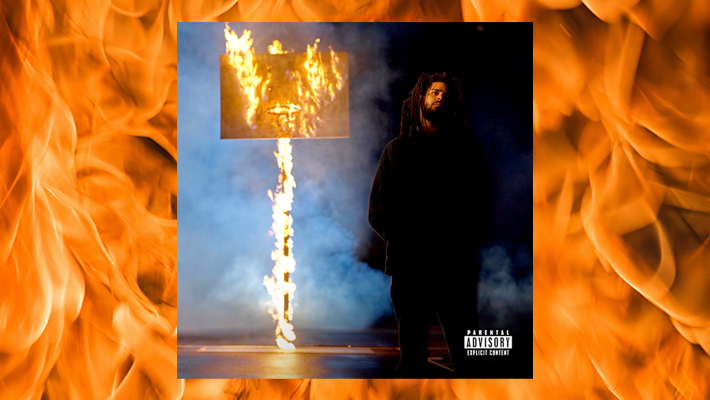In his first-ever professional basketball game, J. Cole looked like he belonged on the court, even though his stats were nothing to write home about. If anything, his debut ball game called to mind memories of his debut project: As long as he stuck to what he was good at and didn’t try too hard, he acquitted himself the way you’d expect from a self-proclaimed future superstar. That quality has held true over the course of the decade since, even up to his latest release, The Off-Season.
If a metaphor comparing the North Carolina native’s rap career to his sports one seems almost too easy, it’s only because Cole himself invited such comparisons with the new album’s title and rollout. Even the cover prominently features a flaming basketball hoop, reinforcing the symbolism of the “off-season” motif. Cole spoke at length in both interviews and his personal documentary about the mentality of drilling and training himself on his already virtuoso raps with the goal of improving to his satisfaction — much like a pro athlete would add new facets to his game between seasons.
Even with the coincidence of his first-ever game, which his longtime friend and manager Ibrahim Hamad even called something of an accident of timing due to the pandemic pushing back both the album’s release and the start of the newly created Basketball Africa League, the parallels practically write themselves. In his limited first-half minutes, Cole was able to score a bucket at the rim on a putback and was even given the honor of shooting the team’s technical free throw — a distinction that is usually only bestowed upon the team’s best shooter on the floor at the time of the foul.
In the second half, though, the team decided to reward Cole’s performance with more indulgences. He was allowed more touches, even bringing the ball up on a few possessions. This increased time brought increased exposure to the flaws in his game: whether because of first-game nerves or simply due to his trying too hard, he was responsible for three turnovers and an airball (as well as a couple of assists), and it was revealed that he either can’t or won’t go left in isolation.
Let’s compare this to his rap work. We know he can rhyme his ass off and he knows it too; this is the strongest facet of his music-making ability and he produces his best, most engaging material when this is what he focuses on. It’s when he overindulges or tries to do too much that his weaknesses as a songwriter get exposed. There’s a tendency to drone on at length about how good he is at rapping; the awkwardly framed, “relatable” songs about things like losing his virginity and folding clothes have drawn as much criticism as praise over the years. Being relatable is one thing; oversharing is another entirely.
On The Off-Season, Cole wisely mitigates most of his most glaring flaws. By keeping the runtime short, he keeps himself on topic and remains efficient in conceptualizing and executing the album’s 12 songs, without the tail-end drag he sometimes delivers on his longer projects. He also varies the production a lot more; rather than producing on every single track, he employs input from hitmakers like Boi 1da, DJ Dahi, Jake One, and T-Minus to set up the plays for him, letting him stick to the aforementioned rhyming without having to split his focus. This is especially useful on tracks like “Pride Is The Devil,” where the production — which samples Aminé’s “Can’t Decide” from the 2020 album Limbo — opens the floor for Cole and Lil Baby’s impressive two-man game on the lyrical end.
He also gets into more personal storytelling, such as on “Let Go My Hand,” where he finally confirms the long-rumored scuffle between himself and Sean Combs. Although the track is scant on details, it’s a far-sight more interesting than the stilted regular-guy raps he used to attempt. We want to hear about his life, not ours, and this is among one of the most up-to-date references he’s offered, even if the incident in question happened nearly five years before. By contrast, the other “relatable” songs he’s offered up over his career were either nostalgic recollections of his childhood in Fayetteville or the painfully earnest “Let Nas Down.”
Mercifully, Cole also cuts down on the attempted social commentary. After admitting that he’s no extensive reader during his 2020 dust-up with an unnamed Twitter user that many thought to be Noname, it seems he’s learned to stick to being more of a role player than aiming to be a do-it-all All-Star. That’s a smart move on his part; it gives critics less to pick at in his lyrical game and makes him look more like the fan-favorite he is. There’s nothing wrong with being a mid-level specialty player — they often get to star in their own right, eventually.
That just leaves the bars themselves as the primary point of contention and those are subjective. Cole’s fans will likely get as much of a kick out of double entendres like “I put an M on your head, you Luigi brother now” as his detractors will side-eye such missives as corny. Likewise, the subject matter — J. Cole’s technically proficient rhyming and wordplay — will get varying mileage depending on the listener’s preference. From the perspective of this writer, there have been many better bars and many worse ones. What Cole does well, he does really well, and it’s easy to appreciate the level of work that went into it without him reminding you once a verse.
That latter aspect tends to detract from just being able to appreciate his talent as it is; it’s a little like those players who have a bad game and conspicuously spend hours in the gym afterward getting up shots. We already know that Cole has had a hit-or-miss career buttressed mostly by the strident insistence of his most outspoken fans. Telling us about how much work he puts in isn’t going to sway listeners who don’t prefer his music. For what it’s worth, many of hip-hop’s most appreciated artists throughout its history have been those who make it look easy and effortless, whose practice stayed behind closed doors and revealed itself under the bright lights in their high-level songwriting, catchy hooks, or intimate storytelling.
Cole’s dedication to the craft, to getting better at it every day, is commendable. Whether that commitment leads to a more entertaining product is debatable. Given The Off-Season’s status as an ostensible set-up for whatever “The Fall-Off” portion of J. Cole’s career will be, it’s possible that he’s just giving us a rare glimpse into the amount of forethought and skill polishing that goes into setting up a 20+year career. That’s pretty cool, but some of us will be looking forward to watching the actual game footage, not just the practice highlights.
The Off-Season is out now via Dreamville. Get it here.





